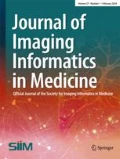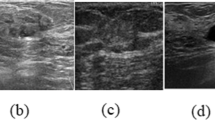Abstract
In this paper, region-difference filters for the segmentation of liver ultrasound (US) images are proposed. Region-difference filters evaluate maximum difference of the average of two regions of the window around the center pixel. Implementing the filters on the whole image gives region-difference image. This image is then converted into binary image and morphologically operated for segmenting the desired lesion from the ultrasound image. The proposed method is compared with the maximum a posteriori-Markov random field (MAP-MRF), Chan-Vese active contour method (CV-ACM), and active contour region-scalable fitting energy (RSFE) methods. MATLAB code available online for the RSFE method is used for comparison whereas MAP-MRF and CV-ACM methods are coded in MATLAB by authors. Since no comparison is available on common database for the performance of the three methods, therefore, performance comparison of the three methods and proposed method was done on liver US images obtained from PGIMER, Chandigarh, India and from online resource. A radiologist blindly analyzed segmentation results of the 4 methods implemented on 56 images and had selected the segmentation result obtained from the proposed method as best for 46 test US images. For the remaining 10 US images, the proposed method performance was very near to the other three segmentation methods. The proposed segmentation method obtained the overall accuracy of 99.32% in comparison to the overall accuracy of 85.9, 98.71, and 68.21% obtained by MAP-MRF, CV-ACM, and RSFE methods, respectively. Computational time taken by the proposed method is 5.05 s compared to the time of 26.44, 24.82, and 28.36 s taken by MAP-MRF, CV-ACM, and RSFE methods, respectively.








Similar content being viewed by others
References
(September). Statistics and outlook for liver cancer. Available: http://www.cancerresearchuk.org/about-cancer/type/liver-cancer/treatment/statistics-and-outlook-for-liver-cancer
W.-L. Lee: An ensemble-based data fusion approach for characterizing ultrasonic liver tissue. Applied Soft Computing 13:3683–3692, 2013.
J. H. Jeon, J. Y. Choi, S. Lee, and Y. M. Ro: Multiple ROI selection based focal liver lesion classification in ultrasound images. Expert Systems with Applications 40:450–457, 2013
J. Virmani, V. Kumar, N. Kalra, and N. Khandelwal: Neural network ensemble based CAD system for focal liver lesions from B-mode ultrasound. Journal of digital imaging 27:520–537, 2014
W.-L. Lee, Y.-C. Chen, and K.-S. Hsieh: Ultrasonic liver tissues classification by fractal feature vector based on M-band wavelet transform. IEEE Transactions on Medical Imaging 22:382–392, 2003
D. Mittal, V. Kumar, S. C. Saxena, N. Khandelwal, and N. Kalra: Neural network based focal liver lesion diagnosis using ultrasound images Computerized Medical Imaging and Graphics 35:315–323, 2011
D. Gupta, R. Anand, and B. Tyagi: A hybrid segmentation method based on Gaussian kernel fuzzy clustering and region based active contour model for ultrasound medical images. Biomedical Signal Processing and Control 16:98–112, 2015
J. Xu, K. Chen, X. Yang, D. Wu, and S. Zhu: Adaptive level set method for segmentation of liver tumors in minimally invasive surgery using ultrasound images. In: Bioinformatics and Biomedical Engineering, 2007. ICBBE 2007. The 1st International Conference on 1091–1094, 2007
W.-L. Lee, Y.-C. Chen, Y.-C. Chen, and K.-S. Hsieh: Unsupervised segmentation of ultrasonic liver images by multiresolution fractal feature vector. Information Sciences 175:177–199, 2005
M. Cvancarova, F. Albregtsen, K. Brabrand, and E. Samset: Segmentation of ultrasound images of liver tumors applying snake algorithms and GVF. In: International Congress Series 218–223, 2005
L. Clarke, R. Velthuizen, M. Camacho, J. Heine, M. Vaidyanathan, L. Hall, et al.: MRI segmentation: methods and applications. Magnetic resonance imaging 13:343–368, 1995
T. F. Chan and L. Vese: Active contours without edges. IEEE transactions on Image processing 10:266–277, 2001
C. Li, C. Xu, C. Gui, and M. D. Fox: Level set evolution without re-initialization: a new variational formulation. In: Computer Vision and Pattern Recognition, 2005. CVPR 2005. IEEE Computer Society Conference on 430–436, 2005
C. Li, C.-Y. Kao, J. C. Gore, and Z. Ding: Minimization of region-scalable fitting energy for image segmentation. IEEE Transactions on Image processing 17:1940–1949, 2008
V. Caselles, R. Kimmel, and G. Sapiro: Geodesic active contours. International journal of computer vision 22:61–79, 1997
C. Li, C.-Y. Kao, J. C. Gore, and Z. Ding: Implicit active contours driven by local binary fitting energy. In: Computer Vision and Pattern Recognition, 2007. CVPR'07. IEEE Conference on 1–7, 2007
J. Yuan: Active contour driven by region-scalable fitting and local Bhattacharyya distance energies for ultrasound image segmentation. IET Image Processing 6:1075–1083, 2012
J. Yuan: Active contour driven by local divergence energies for ultrasound image segmentation. IET Image Processing 7:252–259, 2013
M. Rastgarpour, J. Shanbehzadeh, and H. Soltanian-Zadeh: A hybrid method based on fuzzy clustering and local region-based level set for segmentation of inhomogeneous medical images. Journal of medical systems 38:1–15, 2014
L. O. Hall, A. M. Bensaid, L. P. Clarke, R. P. Velthuizen, M. S. Silbiger, and J. C. Bezdek: A comparison of neural network and fuzzy clustering techniques in segmenting magnetic resonance images of the brain, IEEE Transactions on Neural Networks 3:672–682, 1992
Z. Lao, D. Shen, D. Liu, A. F. Jawad, E. R. Melhem, L. J. Launer, et al.: Computer-assisted segmentation of white matter lesions in 3D MR images using support vector machine. Academic radiology 15:300–313, 2008
S. Ruan, S. Lebonvallet, A. Merabet, and J.-M. Constans: Tumor segmentation from a multispectral MRI images by using support vector machine classification. In: Biomedical Imaging: From Nano to Macro, 2007. ISBI 2007. 4th IEEE International Symposium on 1236–1239, 2007
P. Karasev, I. Kolesov, K. Fritscher, P. Vela, P. Mitchell, and A. Tannenbaum: Interactive medical image segmentation using PDE control of active contours. IEEE Transactions on Medical Imaging 32:2127–2139, 2013
A. Kasaiezadeh and A. Khajepour: Multi-agent stochastic level set method in image segmentation. Computer Vision and Image Understanding 117:1147–1162, 2013
C. Li, R. Huang, Z. Ding, J. C. Gatenby, D. N. Metaxas, and J. C. Gore: A level set method for image segmentation in the presence of intensity inhomogeneities with application to MRI. IEEE Transactions on Image Processing 20:2007–2016, 2011
C. Y. Ahn, Y. M. Jung, O. I. Kwon, and J. K. Seo: A regularization technique for closed contour segmentation in ultrasound images. IEEE Transactions on Ultrasonics, Ferroelectrics, and Frequency Control 58:1577–1589, 2011
M. Kass, A. Witkin, and D. Terzopoulos: Snakes: Active contour models. International journal of computer vision 1:321–331, 1988
X. Wang, W. Zhang, and Q. Ji: Image object extraction with shape and edge-driven Markov random field model. IET Image Processing 8:383–396, 2014
A. Ghosh, B. N. Subudhi, and L. Bruzzone: Integration of Gibbs Markov random field and Hopfield-type neural networks for unsupervised change detection in remotely sensed multitemporal images. IEEE Transactions on Image Processing 22:3087–3096, 2013
Q. Wang: HMRF-EM-image: implementation of the hidden Markov random field model and its expectation-maximization algorithm. arXiv preprint arXiv:1207.3510, 2012
X. Huang, J. Dong, and M. Wang: Paper web defection segmentation using Gauss-Markov random field texture features. In: Image Analysis and Signal Processing (IASP), 2011 International Conference on 167–170, 2011
J. Lai, J. J. Ford, P. O'Shea, and R. Walker: Hidden Markov model filter banks for dim target detection from image sequences. In: Digital Image Computing: Techniques and Applications (DICTA) 312–319, 2008
J. Wu and A. Chung: A segmentation model using compound Markov random fields based on a boundary model. IEEE Transactions on Image Processing 16:241–252, 2007
L. Xie, V. Ugrinovskii, and I. R. Petersen: Probabilistic distances between finite-state finite-alphabet hidden Markov models. IEEE Transactions on, Automatic Control 50:505–511, 2005
J. L. Marroquin, E. A. Santana, and S. Botello: Hidden Markov measure field models for image segmentation. IEEE Transactions on Pattern Analysis and Machine Intelligence 25:1380–1387, 2003
G. Xiao, M. Brady, J. A. Noble, and Y. Zhang: Segmentation of ultrasound B-mode images with intensity inhomogeneity correction. IEEE Transactions on Medical Imaging 21:48–57, 2002
X. Descombes, R. D. Morris, J. Zerubia, and M. Berthod: Estimation of Markov random field prior parameters using Markov chain Monte Carlo maximum likelihood. IEEE Transactions on Image Processing 8:954–963, 1999
X. Liu, D. L. Langer, M. Haider, Y. Yang, M. N. Wernick, and İ. Ş. Yetik: Prostate cancer segmentation with simultaneous estimation of Markov random field parameters and class. IEEE Transactions on Medical Imaging 28:906–915, 2009
N. Paragios, O. Mellina-Gottardo, and V. Ramesh: Gradient vector flow fast geometric active contours. IEEE Transactions on Pattern Analysis and Machine Intelligence 26:402–407, 2004
N. Paragios and R. Deriche: Geodesic active regions and level set methods for supervised texture segmentation. International Journal of Computer Vision 46:223–247, 2002
D. K. Panjwani and G. Healey: Markov random field models for unsupervised segmentation of textured color images. IEEE Transactions on Pattern Analysis and Machine Intelligence 17:939–954, 1995
F. Salzenstein and W. Pieczynski: Parameter estimation in hidden fuzzy Markov random fields and image segmentation. Graphical models and image processing 59:205–220, 1997
W. Cai, S. Chen, and D. Zhang: Fast and robust fuzzy c-means clustering algorithms incorporating local information for image segmentation. Pattern Recognition 40:825–838, 2007
K. Sikka, N. Sinha, P. K. Singh, and A. K. Mishra: A fully automated algorithm under modified FCM framework for improved brain MR image segmentation. Magnetic Resonance Imaging 27:994–1004, 2009
S. P. Chatzis and T. Varvarigou: A fuzzy clustering approach toward hidden Markov random field models for enhanced spatially constrained image segmentation. IEEE Transactions on Fuzzy Systems 16:1351–1361, 2008
M. A. Jaffar, N. Naveed, B. Ahmed, A. Hussain, and A. M. Mirza: Fuzzy C-means clustering with spatial information for color image segmentation. In: Electrical Engineering, 2009. ICEE'09. Third International Conference on, 2009, pp. 1–6.
K.-S. Chuang, H.-L. Tzeng, S. Chen, J. Wu, and T.-J. Chen: Fuzzy c-means clustering with spatial information for image segmentation. Computerized medical imaging and graphics 30:9–15, 2006
Y. Xia, T. Wang, R. Zhao, and Y. Zhang: Image segmentation by clustering of spatial patterns. Pattern Recognition Letters 28:1548–1555, 2007
L. He and I. R. Greenshields: An MRF spatial fuzzy clustering method for fMRI SPMs. Biomedical Signal Processing and Control 3:327–333, 2008
J. Wang, J. Kong, Y. Lu, M. Qi, and B. Zhang: A modified FCM algorithm for MRI brain image segmentation using both local and non-local spatial constraints. Computerized medical imaging and graphics 32:685–698, 2008
S. Chen and D. Zhang: Robust image segmentation using FCM with spatial constraints based on new kernel-induced distance measure. IEEE Transactions on Systems, Man, and Cybernetics, Part B: Cybernetics 34:1907–1916, 2004
D.-Q. Zhang and S.-C. Chen: A novel kernelized fuzzy c-means algorithm with application in medical image segmentation. artificial intelligence in medicine 32:37–50, 2004
D.-W. Kim, K. Y. Lee, D. Lee, and K. H. Lee: Evaluation of the performance of clustering algorithms in kernel-induced feature space. Pattern Recognition 38:607–611, 2005
M.-S. Yang and H.-S. Tsai: A Gaussian kernel-based fuzzy c-means algorithm with a spatial bias correction. Pattern recognition letters 29:1713–1725, 2008
J. Kawa and E. Pietka: Kernelized fuzzy c-means method in fast segmentation of demyelination plaques in multiple sclerosis. In: Engineering in Medicine and Biology Society, 2007. EMBS 2007. 29th Annual International Conference of the IEEE 5616–5619, 2007
L. Liao, T. Lin, and B. Li: MRI brain image segmentation and bias field correction based on fast spatially constrained kernel clustering approach. Pattern Recognition Letters 29:1580–1588, 2008
D. Graves and W. Pedrycz: Performance of kernel-based fuzzy clustering. Electronics Letters 43:1445–1446, 2007
J. Bednar and T. Watt: Alpha-trimmed means and their relationship to median filters. IEEE Transactions on Acoustics, Speech, and Signal Processing 32:145–153, 1984
A. Restrepo and A. C. Bovik: Adaptive trimmed mean filters for image restoration. IEEE Transactions on Acoustics, Speech, and Signal Processing 36:1326–1337, 1988
Y. B. Rytsar and I. B. Ivasenko: Application of (alpha,beta)-trimmed mean filtering for removal of additive noise from images 45–52, 1997
R. Oten and R. J. P. d. Figueiredo: Adaptive alpha-trimmed mean filters under deviations from assumed noise model. IEEE Transactions on Image Processing 13:627–639, 2004
L. Lam, S.-W. Lee, and C. Y. Suen: Thinning Methodologies—A Comprehensive Survey. IEEE Trans. Pattern Anal. Mach. Intell. 14:869–885, 1992
(18 January). bwmorph. Available: https://in.mathworks.com/help/images/ref/bwmorph.html
Author information
Authors and Affiliations
Corresponding author
Rights and permissions
About this article
Cite this article
Jain, N., Kumar, V. Liver Ultrasound Image Segmentation Using Region-Difference Filters. J Digit Imaging 30, 376–390 (2017). https://doi.org/10.1007/s10278-016-9934-5
Published:
Issue Date:
DOI: https://doi.org/10.1007/s10278-016-9934-5




